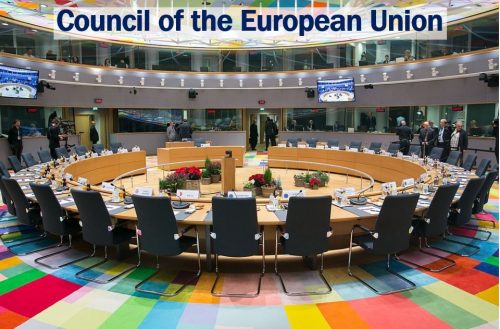The Council of the European Union is the voice of the governments of the countries that are EU members. The Council adopts the new laws and policies of the European Union.
EU stands for European Union. The EU is a political and economic union of twenty-eight member countries. It has developed a single, internal market of 510 million people. It is the largest single consumer market in the world in monetary terms.
The Council, which has existed since 1958, comprises government ministers from each EU member state.
People who make up the Council of the European Union may be specific ministers or heads of governments. In other words, who is in it depends on what the members are discussing.

Council of the European Union – Presidency
Each member state of the EU holds the Presidency on a six-month rotating basis. In other words, the UK may hold the Presidency now for six months, then France, then another country, and so on.
Together with the European Parliament, the Council of the European Union is the EU’s main decision-making body.
According to the old EU dictum, “The Commission proposes, and the Council disposes.”
Europa.eu says the following about the Council of the European Union:
“In the Council, government ministers from each EU country meet to discuss, amend and adopt laws, and coordinate policies.”
“The ministers have the authority to commit their governments to the actions agreed on in the meetings.”
According to Wikipedia:
” The Council of the European Union, along with the European Council, are the only EU Institutions that are not ‘European.'”
“Rather, they are forums where, respectively, ministers, and heads of state/government, from Member States may validly express and represent their own national interests.”
Council of the European Union + 3 other institutions
The EU has four main institutions, which together run the whole Union.
They are:
– The European Commission. This is the EU’s politically independent executive arm.
– The European Parliament. The EU’s law-making body. It comprises 751 MEPs (Members of the European Parliament) that voters across the EU elect every five years.
– The Court of Justice. It makes sure that EU members states and institutions abide by EU law. It has one judge for each EU member state, and also eleven advocate generals.
– The Council of the European Union.
